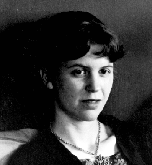

...Her major work on the Jewish theme is her shocking poem "Daddy" (October 1962). During a reading on BBC radio, Plath linked "Daddy" with the Electra of her "Azalea Path" poem and explained that the speaker's father was a Nazi tyrant, her mother a Jewish slave: "Here is a poem spoken by a girl with an Electra complex. Her father died while she thought he was God. Her case is complicated by the fact that her father also was also a Nazi and her mother very possibly part Jewish. In the daughter the two strains marry and paralyze each other--she has to act out the awful little allegory once over before she is free of it." Joyce Carol Oates has mistenly claimed that "like many who are persecuted, {Plath} identified in a perverse way with her own persecutors, and not with those who, along with her, were vicims." though Plath should, by background, have identified with her German father, she sympathized instead with the Jewish victims.
The cruel catharsis of "Daddy" reverses the elgiac tone of "On the Decline of Oracles" (My father died, and when he died/ he willed his books and shell away"), absorbs the barbarous Gothic imagery of Little Fugue" (You had one leg, and a Prussian mind") and adopts the brutal Orwellian image of "The boot in the face" (O'Brien's picture of the future is "a boot stamping on the human face-forever"), which had also appeared in "Ode for Ted," "The Beekeeper's Daughter" and "Berck-Plage."
The poem opens with the Plath-speaker explaining she will no longer allow her father, who betrayed her by dying to oppress her. For thirty years she has lived like a foot enclosed in his black shoe (Otto's foot was amputated), scarcely daring to breathe or sneeze. (The "Achoo" comes directly from the infantile reversal of cause and effect portrayed on the first page of Joyce's
In the fourteenth stanza, the white flame of hatred suddenly but subtly shifts from Otto Plath to Ted Hughes (The "Daddy of her children) as the two villains merge into one single figure. "And I said I do, I do" She is now through with her daddy-husband. She refers to her rage when she heard Assia (Ted Hughes's mistress) calling for Hughes and tore the telephone out of the wall. She now wants to kill both her father and her husband, for Hughes has also tormented her. She wants to drive a stake into the hearts of the demonically possessed and unspeakably cruel betrayers who divided her heart in two. Alluding to the Devon village, the forklorish rites and the manifest guilt of her husband, she repeats the incantation of the incriminating "you" and in is finally released from his evil powers:
They are dancing and stamping on you
They always
Daddy, daddy, you bastard, I'm through.
Plath's poem has been subject to devastating criticism that reveals serious flaws in her work.. James Dickey takes a tough, no-nonsense approach to mental illness and dismisses the "'Daddy' is ridiculously bad; it's embarrassing! She's the Judy Garland of American poetry. If you want to kill yourself, you don't make an
